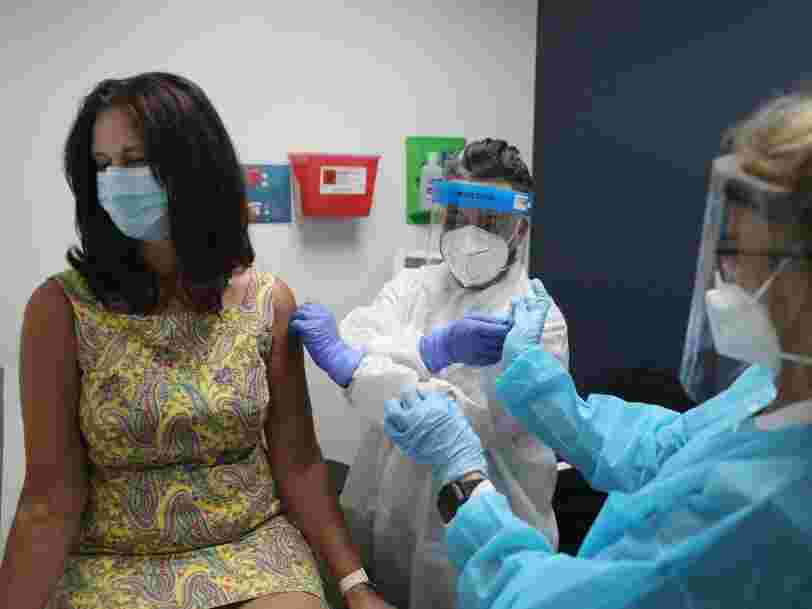AstraZeneca's COVID-19 shot was 79% effective in large trial, paving the way for approval in the US despite troubles in Europe
Dr. Catherine Schuster-Bruce | Publié le | Mis à jour le- Health
-
Recevoir tous les articles sur ce sujet.
Vous suivez désormais les articles en lien avec ce sujet.
Voir mes sujets suivisCe thème a bien été retiré de votre compte

- The COVID-19 shot from Oxford University and AstraZeneca was 79% effective in large trial in US.
- The vaccine was safe and there was no evidence of blood clots in the US trial.
- The drugmaker can now submit the data to the US regulator.
- Visit the Business section of Insider for more stories .
The COVID-19 vaccine co-developed by AstraZeneca and University of Oxford was 79% effective at protecting against coronavirus in the vaccine's largest trial yet, the drugmaker said on Monday.
The drugmaker can now submit the data from the trial to be scrutinized by the US regulator, the Food and Drug Administration (FDA approval).
Sarah Gilbert, professor of vaccinology and lead researcher at Oxford University, told BBC Radio 4 Monday that it could take "some weeks" for the FDA's final decision.
The results come at a difficult time for AstraZeneca. The company is at the center of a political fight between the UK and EU over supply of the drug.
And in recent weeks, more than a dozen countries suspended use of its shot to investigate a so-far unsubstantiated link between getting the shot and developing blood clots.
The European regulator said Friday that the vaccine did not increase the risk of clots overall, but it was further investigating reports of extremely rare blood clots in the brain. Some European countries lifted their suspensions following the regulator's ruling.
In the US trial, the vaccine was safe and there was no evidence of blood clots in the brain, which researchers specifically looked for.
The US trial tested AstraZeneca's two-dose shot to see whether it protected against symptomatic COVID-19, looking at cases that occurred at least 15 days after the second dose. The trial included more than 32,000 participants over 18 years old across 88 locations in the US, Chile and Peru.
The results are yet to be published in a peer-reviewed journal to be scrutinized by experts.
Existing coronavirus vaccines in the US from Moderna and Pfizer-BioNTech, were roughly 95% effective at protecting against COVID-19 in similar size trials in November.
The World Health Organization has recommended AstraZeneca's vaccine for those over 18 years old on February 10. The shot is already authorized for emergency use in the UK, the EU, and several other countries.
COVAX , the scheme WHO's global initiative to ensure equal distribution of COVID-19 vaccines, said February 8 that it planned to distribute nearly 350 million doses of AstraZeneca's vaccine in the first half of the year. The vaccine is easier to store and distribute than those available from Moderna and Pfizer that require colder temperatures. It is also cheaper because AstraZeneca has said it will sell at non-profit throughout the the pandemic.
The company said in November that it was making manufacturing capacity for up to three billion doses of the vaccine in 2021, on a rolling basis.
Two full doses, four weeks apart
The US trial was a less complicated design than previous trials run by the University of Oxford and AstraZeneca.
Studies run out of the UK and Brazil found that the shot was 72% effective, on average, at protecting against symptomatic COVID-19. That 72% was an average because the vaccine worked differently at different doses, with 62% efficacy when two full doses were given, but 90% efficacy when the first dose was halved.
In the US trial, participants got two full doses of the vaccine.
Effective in older people
Gilbert told BBC Radio 4 Monday that there was no drop in protection for older people and it was "just as good" as for younger people.
Approximately 20% of trial participants were over 65 years-old, according to the press release.
There have been confusing rulings about its effectiveness in older people.
Germany, France and others did not initially authorize it for people over 65, citing insufficient evidence in this age group, despite the EMA's ruling that the vaccine was safe and effective.
Germany, France and most other European countries have since backtracked .
Inscrivez-vous gratuitement à notre newsletter quotidienne
Via PakApNews